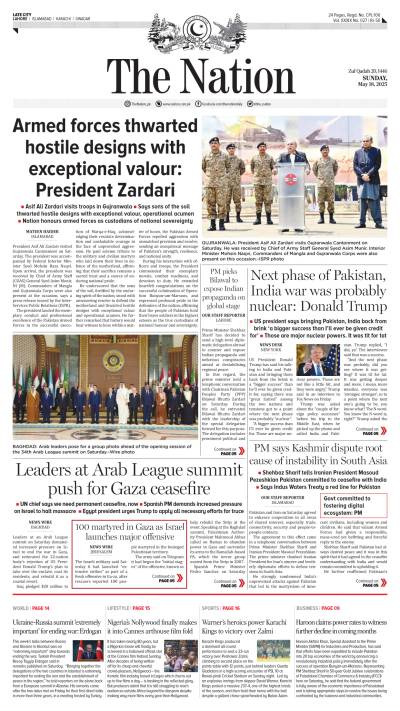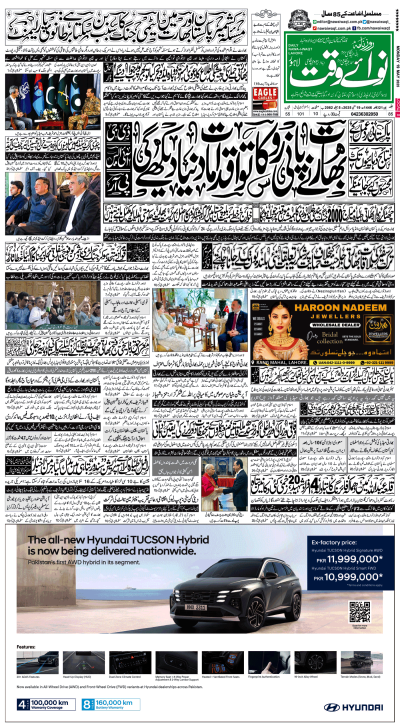LAHORE - Counter-terror sections of two leading security agencies have caught nearly two dozen high-profile facilitators of the terrorists during the ongoing operation in southern Punjab, intelligence sources told The Nation yesterday.
Around 100 terror facilitators have also been arrested by the police and Punjab Counter Terrorism Department (CTD) during operation against Choto gang and others in Rojhan tehsil of Rajanpur district, claimed a police spokesperson.
However, premier security agencies are after high-profile targets who are connected with banned outfits and spy rings fuelling subversion across the country, said the intelligence sources.
An aggressive anti-terror operation is on in southern Punjab under the lead of the Army. The operation, being conducted by the Rangers, CTD and police, was launched after the deadly suicide attack of Gulshan-e-Iqbal park of Lahore on the insistence of military high command.
Engaging the Rangers to effectively smash banned outfits in southern part of the province remained an unresolved matter among the partners of Punjab apex committee since its crucial meeting in November 2015.
However, the Gulshan-e-Iqbal carnage changed the scenario and not only the Rangers were engaged to deal with the matter but Army troops’ assistance and their lead role was also put into action.
The neutralised facilitators of terrorists were operating in the highly sensitive operation areas – Rahim Yar Khan, Dera Ghazi Khan, Muzaffargarh, Bahawalpur, Rajanpur and Multan – under the cover of religious seminaries and foreign funded non-governmental organisations (NGOs).
More than five of the caught were mid-ranking local tribesmen who were also facilitating the banned outfits’ members in their activities. The identities of the neutralised facilitators will be kept secret until the catch of their remaining associates, the sources added.
The detained facilitators told interrogators that they were acting on their own and the seminaries and NGOs have no part in their actions.
They also said they were helping the banned organisations solely for monetary benefits.
They used to provide housing, transportation, information, messaging and communication, and healthcare facilities to the terrorists when they would came down into the settled areas from the no-go-areas on Punjab borders with Balochistan and Sindh, said the intelligence sources.
Some of the banned organisations members would make three to four months leisure tours to southern Punjab after carrying out activities in Balochistan, Karachi and parts of Punjab. The tours were also made to evade the eye of the security agencies for a certain period of time.
They would usually swap their areas of activity as a militant coming from Balochistan would not necessarily return to the same province and in next tour he could go to Karachi because all such elements were working in well-knitted networks.
Most of the neutralised facilitators were found to be connected with banned TTP and its splinters, al-Qaeda, Lashkar-e-Jhangvi and Sipah-e-Muhammad Pakistan. Some of the facilitators working under the cover of NGOs were connected with Baloch separatist organisations, the intelligence sources added.
The raids which busted these facilitators were part of the intelligence-led special operations to purge southern Punjab, especially the no-go-areas, of terrorists.
All those caught in special operations fall under ‘Black’ category which means they were connected with the terrorists who carried out deadly attacks on Pakistani soil. The key facilitators were part of the high priority list of the two security agencies of the military which they prepared this year.
The two agencies are also preparing lists of suspected ‘influential figures’ in southern Punjab who have contacts with banned outfits, the sources said.
Although the military agencies have their own dossiers with regard to terror targets, they have also with them a list of more than 100 most-wanted terrorists in the Punjab, prepared by the civilian agencies last year.
Monday, May 19, 2025
Dozens of terror facilitators nabbed in southern Punjab
-
Lahore emerges among safest global cities in Numbeo 2025 index
-
Lahore emerges among safest global cities in Numbeo 2025 index
-
India’s suspension of Indus Water Treaty legally baseless
-
Seventh polio case reported in Pakistan amid nationwide vaccination drive
-
Pakistan reports sixth polio case of 2025
-
PTA begins issuing VPN licences to regulate usage
Regional Reset
May 19, 2025
Peak Potential
May 19, 2025
United Front
May 19, 2025
Culture Shift
May 18, 2025
Tactical Shift
May 18, 2025
Pakistan’s Strategic Edge
May 19, 2025
Lessons for India
May 19, 2025
Galiyat’s Poor Network Services
May 19, 2025
A City in Neglect
May 19, 2025
Rising Cost of Living
May 19, 2025
ePaper - Nawaiwaqt
Nawaiwaqt Group | Copyright © 2025





